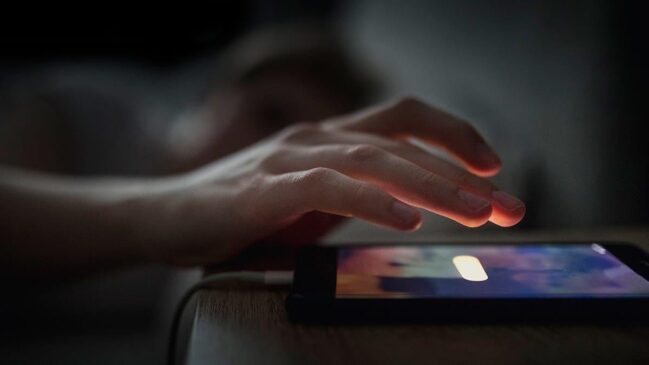Blog
Best sleeping apps for iPhone and Samsung
August 14, 2020
4 minutes, 25 seconds

We’ve all experienced the tiredness, lack of focus and potential irritability that goes hand in hand with a poor night’s sleep. But when we experience extended periods of sleep deprivation, it can have a significant impact not only on our ability to work and get the most from life, but on our mental and physical health too.
According to the NHS, one in three of us suffers from poor sleep. Unfortunately, this widespread sleep deprivation has only become worse since the start of the coronavirus pandemic and the UK lockdown.
Research carried out in May 2020 found that more than half of the people surveyed had experienced trouble sleeping since lockdown began, while two in five said they’d had more vivid dreams than usual. It’s certainly been a testing time unlike anything we’ve known before, so it’s not surprising that these events have resulted in disturbed sleep for many of us.
If you’re one of the many who regularly struggle to sleep through the night, a sleeping app could help. Here, we explore why sleep is so crucial to our physical and mental health, and list some of the best sleep apps available on both iPhone and Android.
Why is sleep so important?
It’s not known exactly why we sleep, but what we do know is that it is a vital part of good health and wellbeing. We may not be aware of it, but our bodies are far from passive when we are sleeping. Light, deep, and REM sleep cycles all play a role in restoring us physically, from consolidating our memories and releasing vital hormones, to repairing our heart, muscles and blood vessels.
While one night of broken sleep is enough to negatively affect our moods, attention span and cognitive ability the next day, it won’t do us any long-term harm. However, chronic sleep deprivation/ sleep debt can have a severe impact on us, from increasing the risk of stroke and heart disease, to greatly increasing the chances of developing a major depressive disorder.
In addition to this, The Sleep Council state that a lack of sleep is known to exacerbate the symptoms of anxiety and depression, as well as making you more susceptible to developing them in the first place. Both the quality and quantity of sleep we get will impact mental health over time, so it’s important to ensure you get 7-8 hours of uninterrupted sleep a night, if you can.
This is the amount of sleep experts believe most adults need (although some people may function perfectly well with less), so it’s a good benchmark to aim for.
Best sleep apps available on iPhone and Android
If you find it hard to sleep through the night every now and then, a sleeping app may help. Designed to help you drift off to sleep or to help you track your sleeping patterns, a sleep app can be a valuable tool in the pursuit of a good night’s rest.
However, if regular sleeplessness is impacting your life, we recommend speaking to your GP. [LP1]
Relax Melodies - Sleep Sounds
- Available on both iPhone and Android
- Free
Many people find silence distracting when trying to fall asleep, and instead prefer the soothing sounds of relaxing music, ASMR or a guided meditation. This sleeping app has a huge library of sounds, music, meditations and stories to choose from, which you can mix to create your own unique audio sleep accompaniment.
You can also set a nightly bedtime reminder and programme the app to stop playing your sleep mix after a set amount of time.
Sleep Cycle – Sleep Tracker
- Available on both iPhone and Android
- Free
This highly rated free sleep tracker app uses sound analysis via your phone’s microphone to assess your sleep states as you rest, so there’s no need to wear a linked wristband or place your phone under your pillow. You get a breakdown of your sleep activity every morning, including detailed sleep statistics and graphs.
Pillow Automatic Sleep Tracker
- For iPhone and Apple Watch
- Free
Although this sleep app will work without one (you can put your iPhone or iPad next to you in bed), it works most effectively through an Apple Watch. Designed to detect and analyse your sleep when you wear your Apple Watch as you rest, it records any sounds you make in your sleep, including snoring, sleep talking and sleep apnoea. Its smart alarm clock also wakes you at the optimum moment – the lightest possible sleep stage.
Sleep as Android
- For Android
- Two-week free trial
This sleep tracker app integrates with several wearable device apps, including Android Wear OS and Galaxy Gear. It rates your sleep nightly using either the sensors in your phone or your wearable device, assessing criteria such as duration, deficit and deep sleep percentage. It even features an alarm with CAPTCHA verification, so you’ll never oversleep again!
Calm – Meditate, Sleep, Relax
- Available on both iPhone and Android
- Free, with premium paid features
If you like it, it’s worth upgrading to the full paid version of this sleep app, which also boasts a huge collection of guided and unguided meditations and relaxing music. Its sleep stories for adults and children are regularly updated and feature many celebrity narrators, from Harry Styles to Matthew McConaughey.